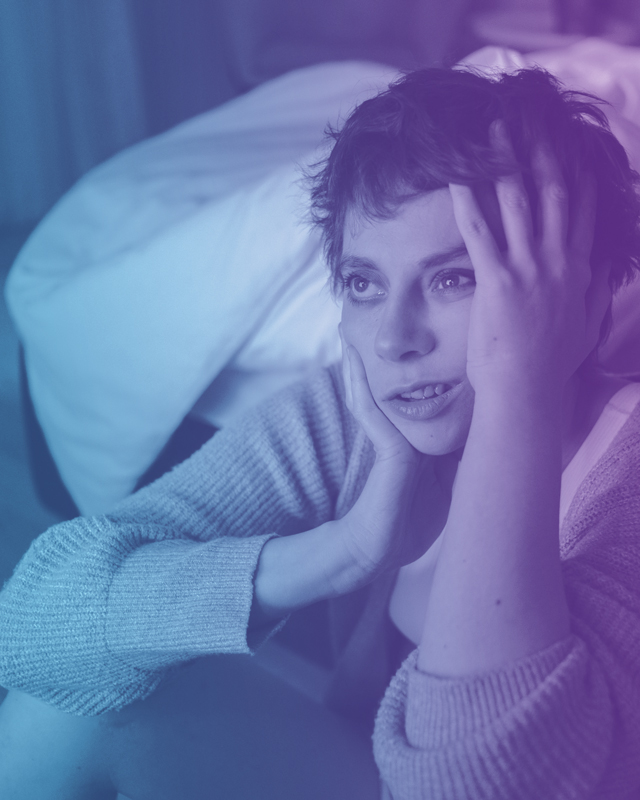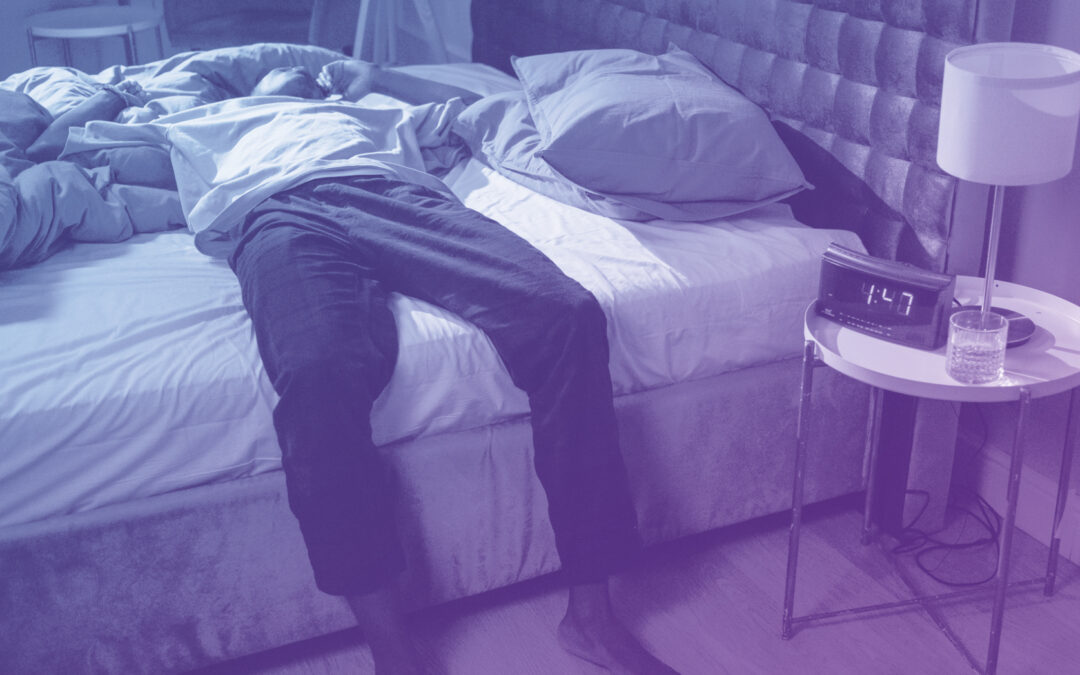The Connection Between Alcohol Abuse and Disrupted Sleep
Alcohol’s sedative effects are well documented and widely known. Most people don’t realize that alcohol can also act as a stimulant and contribute to a wide range of sleep disruption and problems. In the first few sips of alcohol, it can increase your heart rate, raise your dopamine levels and cause aggression in some people, all effects of stimulants. After the stimulant effects wear off, the more significant depressant effects of alcohol become more prevalent in the body. This includes sleepiness or sedation. Despite these sedative side effects, alcohol will not give you a better night’s sleep. Instead, it may lead to unhealthy sleep habits and cause more problems.

What Healthy Sleep Looks Like
To understand how alcohol impacts your sleep, first, it’s important to know what healthy sleep habits look like. Having regular, healthy sleep each night can improve your health and mood. In contrast, not getting enough sleep can have a negative impact on the body and your overall health.
The first component of healthy sleep is the number of hours you sleep each night. Sleep experts recommend that adults get at least seven hours of sleep each night. Babies and children need even more hours of sleep. In addition to getting enough hours of sleep, it’s also important to stay asleep and not wake up in the middle of the night. Frequent wake-ups in the night disrupt the sleep cycle and can make you feel tired and irritable in the morning and throughout the day.
The sleep cycle includes different types of sleep, such as REM, which is the deepest form of sleep. REM means rapid eye movement, and it is the period of sleep time where the brain is most active. In REM sleep, you may have more dreams. The other type of sleep in the cycle is non-REM sleep. With non-REM sleep, the body may go back and forth between light and deep sleep.
There are four stages of sleep each night. The first three stages are light and deep non-REM sleep that helps the body get ready for REM sleep. After about 90 minutes, the body enters the final stage of sleep, the REM stage.
Why Your Body Needs a Good Night’s Sleep
Sleep offers the body many different benefits. The advantages to the body start in the brain. During sleep, it is thought that the body helps remove waste from the brain cells. This process makes new learning, memory and brain function healthier. Sleep deprivation can make someone feel less sharp and struggle to digest new information.
Having a healthy sleep cycle is also beneficial to the immune system. Sleep may play a role in boosting the body’s immune system cells and help fight different diseases and infections. A lack of sleep may have a detrimental impact on the body’s ability to fight illness.
People who are trying to lose weight may also have a more difficult time if they aren’t getting a full night’s rest. Both the body’s metabolism and appetite are influenced by your sleep habits. Missing out on sleep may impact the body’s appetite control hormones and make you hungrier during the day. That and a lack of energy may make it more challenging to keep extra weight off.
Your body also needs enough time asleep to reset the blood sugar in your cells. If you don’t get enough sleep every night, your body may struggle with glucose levels and have a higher risk of developing diabetes. Blood pressure is also linked to appropriate sleep habits and can be healthier if someone is getting enough sleep at night.
Alcohol’s Impact on Your Nighttime Routine
After a night of drinking right before bed, your sleep routine may be impacted. Having alcohol in your system at bedtime may prevent your body from going through the four stages of sleep and getting enough deep sleep. Instead, as the alcohol wears off, you may experience more wake-ups and disruptions. Sleep deprivation may result in other problems in your body, such as feeling tired all day and an increased risk for some conditions. Here are the other ways alcohol affects your sleep:
Breathing
Alcohol may put people who have breathing problems more at risk. Its sedative properties may also impact the breathing muscles. Drinking before bedtime can also worsen the effects of sleep apnea, where someone may stop breathing for a short period of time during sleep.
Nightmares
Heavy drinking before bed or regular alcohol use right before you go to sleep may also cause you to have more intense dreams and nightmares. The reason for this is alcohol causes disturbances during both REM and non-REM sleep. Someone with alcohol in their system may be in and out of consciousness throughout the night. The dreams you would normally have during the REM stage may be interrupted and irregular.
Other Sleep Problems
Alcohol may also lead to other types of sleep disorders that could be harmful. Drinkers may have higher instances of sleepwalking, talking in their sleep or other situations where they are in between being awake and asleep. Sleep disorders like night terrors are also possible when someone uses substances like alcohol right before bed.
Practice Healthier Habits Before Bed
The next day after a heavy night of drinking may also be uncomfortable due to lack of sleep. It’s common to feel groggy and short-tempered the day after drinking before bed. Additionally, some people may not be as alert and struggle the next day at work or school. Regular drinking before bed can make daily activities more challenging over time. It’s recommended to practice healthier habits with alcohol and your sleep routine. Instead of reaching for a cocktail or a glass of wine right before bed, it’s better to drink something that promotes a good night of rest.
First, if you are planning to drink, schedule it a few hours before bed, such as during dinner. It’s best to limit the number of drinks so it doesn’t lead to impairment and make you drink even more throughout the night. Drinking in the late afternoon or dinner and stopping a few hours before you go to sleep will give your body enough time to metabolize the alcohol and keep it from interrupting your night routine.
It may be better to drink beverages that are known for promoting good sleep habits. A good drink to try before bed is chamomile tea, which is known to have calming effects. It’s also beneficial to the body to drink something with bananas or protein in it, such as a smoothie or a glass of milk.
Get Help With a Healthier Dose of Sleep
If you use alcohol before bed to help you fall asleep, you may be doing more to harm your ability to get a good night’s rest. While alcohol may help you fall asleep quickly when you lay down to bed, it could potentially make your night of sleep more disturbed. Drinking each night before bed can lead to a host of health problems and make your body crave healthy sleep.
When it’s difficult to stop drinking each night, this may be a sign of alcohol addiction. Even if you only drink right before bed, it could still be a problem. If you or someone you care about is struggling with possible alcohol addiction, help is available. There are many different types of alcoholism treatment options for people who are having a problem stopping drinking.
At first, it may be really challenging to change up your sleep routine and stop using alcohol or other substances to help you fall asleep. Some people may even experience withdrawal symptoms at first, such as insomnia. At Clean Recovery Centers, the staff is here to guide you to a healthier type of sleep that does not rely on substances or alcohol. You can finally get a full night of sleep and feel refreshed and energetic the next morning instead of tired and foggy. Contact the team at Clean Recovery Centers to get started on being healthier with sleep.
Sources:
- https://www.healthline.com/nutrition/is-alcohol-a-stimulant
- https://www.sleepfoundation.org/sleep-hygiene/what-is-healthy-sleep
- https://my.clevelandclinic.org/health/articles/12148-sleep-basics
- https://www.webmd.com/sleep-disorders/sleep-101
Recent Posts


